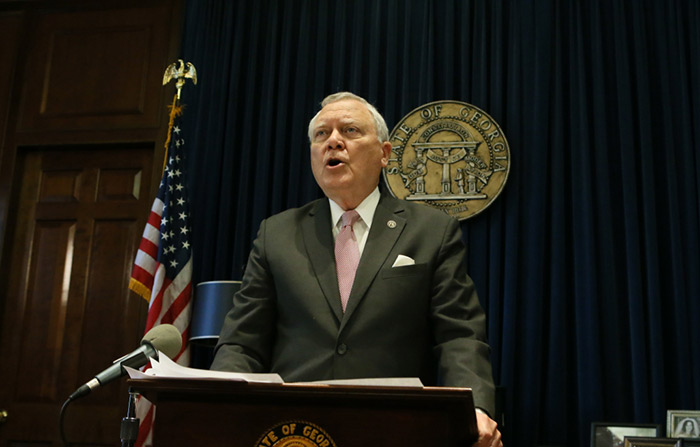>> Georgia ‘Religious Liberty’ Bill Veto: HB 757 Anti-LGBT Legislation To Be Rejected By Gov Nathan Deal
[spacer]
Sous la pression de l’opinion et de grandes entreprises, le gouverneur républicain de l’Etat américain de Géorgie, Nathan Deal, a annoncé, lundi 28 mars, qu’il mettrait finalement son veto au passage d’une loi discriminatoire, tandis qu’un débat de même nature fait rage en Caroline du Nord.
Adoptée à la mi-mars par le sénat, la mesure dite « HB 757 » qui visait officiellement à « protéger la liberté religieuse » autorisait également les membres des organisations confessionnelles de se dissocier des activités jugées contraires à leurs convictions, pour refuser par exemple d’employer des personnes LGBT ou servir des clients homosexuels au nom de croyances personnelles.
Le texte devait être ratifié par le gouverneur. Tout en se défendant de céder à la pression, M. Deal a expliqué : « Je ne pense pas que nous ayons besoin de discriminer pour protéger la communauté des croyants de Géorgie, dont ma famille et moi-même avons fait partie toute notre vie. »
L’organisation Human Rights Campaign (HRC), le plus important groupe de défense en matière de droits des personnes LGBT aux Etats-Unis, a salué la décision du gouverneur.
Victory in Georgia! @GovernorDeal to veto anti-LGBT bill. #NoHateInMyState pic.twitter.com/PeOYSGpKs9
— HumanRightsCampaign (@HRC) 28 mars 2016
Signe d’une mutation profonde de la société, plusieurs grands groupes avaient pris position publiquement contre cette loi, notamment Time Warner, Sony, ou Disney mais aussi des sociétés industrielles, comme Dow Chemicals, Unilever et Intel, menaçant de transférer leurs activité ailleurs qu’en Géorgie si le texte entre en vigueur. Une série d’acteurs et de figures de Hollywood (Aaron Sorkin, Ryan Murphy, Diablo Cody, Lee Daniels, Anne Hathaway, Julianne Moore) avaient également écrit au gouverneur. Selon le bureau du tourisme d’Atlanta, une quinzaine de conventions risquaient d’être ainsi annulées, ce qui ferait perdre 6 milliards de dollars à l’économie locale.
[spacer]
[spacer]
Mouvement similaire en Caroline du Nord
Un mouvement similaire a été lancé pour amener la Caroline du Nord à revenir sur le vote d’une loi ratifiée mercredi dernier par les parlementaires républicains, sous l’égide du gouverneur Pat McCrory, empêchant toute collectivité locale de prendre de nouvelles dispositions antidiscriminatoires.
Le texte impose notamment l’utilisation des toilettes publiques correspondant à l’identité sexuelle. Dans le cas des personnes transgenres, seules celles pouvant présenter un certificat médical attestant de leur changement de genre pourront accéder aux toilettes de leur choix.
Comme en Géorgie, plusieurs rassemblements de protestation ont eu lieu et de nombreuses sociétés de premier plan ont réclamé le retrait de la loi. La ligue professionnelle américaine de basket-ball (NBA) a prévenu, dans un message publié jeudi sur Twitter, que le maintien de la loi pourrait avoir des conséquences sur l’All-Star Game 2017, match de gala dont la tenue est prévue à Charlotte, la plus grande ville de Caroline du Nord.
[spacer]
>> A Georgia bill that would let businesses and individuals withhold their services from gay, lesbian, bisexual and transgender people on so-called religious liberty grounds will be vetoed, the governor announced Monday.
« I do not think that we have to discriminate against anyone to protect the faith-based community of Georgia that me and my family have been a part of for all our lives, » Republican Georgia Gov. Nathan Deal said Monday morning. He added that his decision was not pushed by pressure from companies that threatened to withhold their business from the state. Instead, he cited the state’s « character » as a primary reason for his veto.
« I believe it is about the character of our state and the character of our people. Georgia is a welcoming state, » Deal said.
The measure, formally called HB 757, met considerable opposition both within the state and outside. Deal’s chief of staff sent an email to the top aide to state House Speaker David Ralston indicating potential economic fallout if the bill were passed into law, reported AJC.com.
“We received official notification this morning that Georgia was dropped from contention from two pending economic projects we had been working at GDEC prior to any decision being made on the bill,” Riley wrote, referring to the Georgia Department of Economic Development. “Both projects cited HB 757 as why they were removing Georgia from consideration.”
An official summary of the bill follows:
A bill to be entitled an Act to protect religious freedoms; to amend Chapter 3 of Title 19 of the Official Code of Georgia Annotated, relating to marriage generally, so as to provide that religious officials shall not be required to perform marriage ceremonies in violation of their legal right to free exercise of religion; to amend Chapter 1 of Title 10 of the Official Code of Georgia Annotated, relating to selling and other trade practices, so as to change certain provisions relating to days of rest for employees of business and industry; to protect property owners which are religious institutions against infringement of religious freedom; to define a term; to provide an effective date; to repeal conflicting laws; and for other purposes.
Critics noted that clergy are already protected by the First Amendment from having to perform any marriages they object to.


















